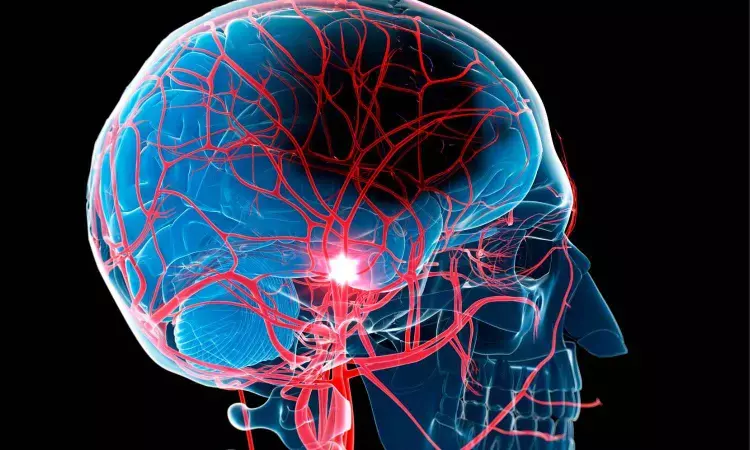- Home
- Medical news & Guidelines
- Anesthesiology
- Cardiology and CTVS
- Critical Care
- Dentistry
- Dermatology
- Diabetes and Endocrinology
- ENT
- Gastroenterology
- Medicine
- Nephrology
- Neurology
- Obstretics-Gynaecology
- Oncology
- Ophthalmology
- Orthopaedics
- Pediatrics-Neonatology
- Psychiatry
- Pulmonology
- Radiology
- Surgery
- Urology
- Laboratory Medicine
- Diet
- Nursing
- Paramedical
- Physiotherapy
- Health news
- Fact Check
- Bone Health Fact Check
- Brain Health Fact Check
- Cancer Related Fact Check
- Child Care Fact Check
- Dental and oral health fact check
- Diabetes and metabolic health fact check
- Diet and Nutrition Fact Check
- Eye and ENT Care Fact Check
- Fitness fact check
- Gut health fact check
- Heart health fact check
- Kidney health fact check
- Medical education fact check
- Men's health fact check
- Respiratory fact check
- Skin and hair care fact check
- Vaccine and Immunization fact check
- Women's health fact check
- AYUSH
- State News
- Andaman and Nicobar Islands
- Andhra Pradesh
- Arunachal Pradesh
- Assam
- Bihar
- Chandigarh
- Chattisgarh
- Dadra and Nagar Haveli
- Daman and Diu
- Delhi
- Goa
- Gujarat
- Haryana
- Himachal Pradesh
- Jammu & Kashmir
- Jharkhand
- Karnataka
- Kerala
- Ladakh
- Lakshadweep
- Madhya Pradesh
- Maharashtra
- Manipur
- Meghalaya
- Mizoram
- Nagaland
- Odisha
- Puducherry
- Punjab
- Rajasthan
- Sikkim
- Tamil Nadu
- Telangana
- Tripura
- Uttar Pradesh
- Uttrakhand
- West Bengal
- Medical Education
- Industry
Anticoagulant Monotherapy alone, best for Stroke Prevention in AF with Atherosclerosis: JAMA

Researchers have found in a new study that in patients with nonvalvular atrial fibrillation (AF) and atherosclerosis, the addition of antiplatelet therapy to anticoagulants did not reduce ischemic events but significantly increased bleeding risk. Researchers conclude that anticoagulant monotherapy may be a safer option for this high-risk population. The study was published in JAMA Neurology by Shuhei O. and colleagues.
This multicenter, open-label, randomized clinical trial was conducted across 41 sites in Japan between November 2016 and March 2025, including adults with ischemic stroke or transient ischemic attack (TIA) within 8 to 360 days of onset, confirmed nonvalvular atrial fibrillation, and at least one manifestation of atherosclerotic cardiovascular disease (ASCVD) (such as carotid or intracranial artery stenosis, ischemic heart disease, peripheral artery disease, or noncardioembolic stroke). The trial was arranged to check if an antiplatelet drug added to anticoagulant therapy would enhance clinical outcomes over anticoagulant monotherapy.
316 patients were randomized and enrolled into two groups: 159 in combination therapy (anticoagulant + antiplatelet) and 157 in anticoagulant monotherapy. The mean (SD) age was 77.2 (7.4) years, and 28.5% (n = 90) were women. The data were analyzed between April and October 2024.
The main outcome was a composite of ischemic cardiovascular events and major bleeding during two years. Secondary endpoints were ischemic cardiovascular events, and safety endpoints were major and clinically relevant nonmajor bleeding. The study was prematurely stopped on July 18, 2023, after an interim analysis revealed that there was no additional benefit expected from further enrollment.
Key Findings
The outcomes showed no significant ischemic difference between the two treatment arms but a significantly higher risk of bleeding in the combination arm:
• The main outcome occurred in 17.8% of combination therapy group patients and 19.6% of monotherapy group patients (HR, 0.91; 95% CI, 0.53–1.55; P = .64), with no significant advantage to the addition of an antiplatelet.
• Ischemic cardiovascular events occurred in 11.1% of the patients who were on combination therapy and 14.2% of the patients on monotherapy (HR, 0.76; 95% CI, 0.39–1.48; P = .41), once more indicating no notable decrease in ischemic risk.
• Yet, for major and clinically significant nonmajor bleeding, 19.5% of the combination therapy group experienced events in comparison to 8.6% of the monotherapy group (HR, 2.42; 95% CI, 1.23–4.76; P = .008), a greater than twofold increase in risk.
These results affirm that although theoretical benefits for dual therapy may exist in reducing thrombotic events, these do not translate to a benefit in total outcomes and significantly increase the risk of harm from bleeding.
In this randomized clinical trial of patients with ischemic stroke or TIA and concurrent nonvalvular atrial fibrillation and atherosclerotic cardiovascular disease, the addition of an antiplatelet agent to anticoagulant therapy did not enhance clinical outcomes but rather enhanced bleeding risk. This research supports maintaining the reduction of unnecessary dual therapy to weigh efficacy with safety for the patient.
Reference:
Okazaki S, Tanaka K, Yazawa Y, et al. Optimal Antithrombotics for Ischemic Stroke and Concurrent Atrial Fibrillation and Atherosclerosis: A Randomized Clinical Trial. JAMA Neurol. Published online October 06, 2025. doi:10.1001/jamaneurol.2025.3662
Dr Riya Dave has completed dentistry from Gujarat University in 2022. She is a dentist and accomplished medical and scientific writer known for her commitment to bridging the gap between clinical expertise and accessible healthcare information. She has been actively involved in writing blogs related to health and wellness.
Dr Kamal Kant Kohli-MBBS, DTCD- a chest specialist with more than 30 years of practice and a flair for writing clinical articles, Dr Kamal Kant Kohli joined Medical Dialogues as a Chief Editor of Medical News. Besides writing articles, as an editor, he proofreads and verifies all the medical content published on Medical Dialogues including those coming from journals, studies,medical conferences,guidelines etc. Email: drkohli@medicaldialogues.in. Contact no. 011-43720751


